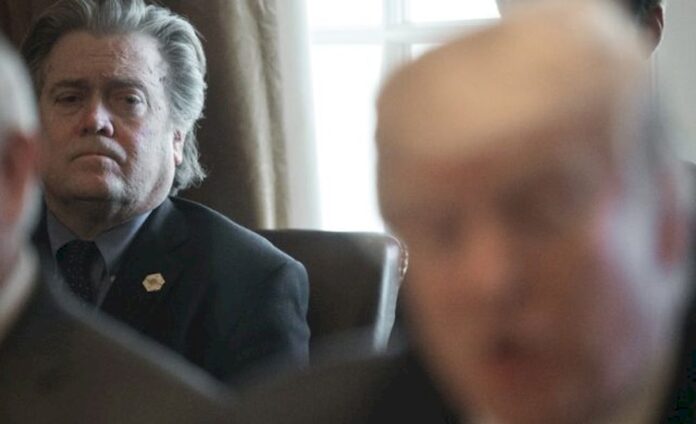The House January 6 select committee was moving to hold the former president’s key ally Steve Bannon in criminal contempt for his no-show. — AFP pic
WASHINGTON, Oct 17 — It was supposed to be a critical week in the congressional investigation into the January 6 Capitol insurrection, focusing on the role of Donald Trump in the riot that threatened US democracy.
The former president’s key ally Steve Bannon and loyalist staffer Kash Patel were to appear Thursday while his White House chief Mark Meadows and social media guru Dan Scavino were on the docket for Friday.
But none turned up after Trump claimed “executive privilege” barring their participation — highlighting the limits of Congress’s authority to investigate leaders who just don’t want to be held to account.
The House January 6 select committee has repeatedly vowed to take tough action over subpoena holdouts, and kept its word by announcing members were moving to hold Bannon in criminal contempt for his no-show.
Meadows and Patel bought themselves more time with the committee, US media reported Thursday, agreeing to short postponements. Scavino’s deadline was also delayed.
The panel has enjoyed moderate successes, with former acting attorney general Jeffrey Rosen testifying this week about pressure from Trump to involve the Justice Department in the former president’s election fraud misinformation campaign.
Meanwhile, House Democrats have introduced legislation to speed up the enforcement of subpoenas.
But for now, say critics, Congress has proved powerless to stop the twice-impeached and twice-acquitted Trump from stonewalling every attempt to investigate the many allegations of malfeasance he has faced.
Fiona Hill, a senior fellow at the Brookings Institution and a one-time deputy assistant to Trump, said in an interview Wednesday that his defiance of Congress and election fraud lies were part of “a slow motion coup.”
Congress has a few legal avenues it can follow in a bid to outmaneuver Trump. But the former reality TV star will be dipping into his own bag of tricks honed over two impeachment probes.
Executive privilege
The Supreme Court has ruled that presidents can keep certain documents and discussions confidential and Trump is far from the first to take advantage of this carve-out.
The 75-year-old New Yorker first claimed executive privilege in 2019 to deny Congress access to the full Mueller report providing significant evidence that his campaign supported a Russian attack on the US election.
But the current occupant of the Oval Office generally gets to decide when this privilege applies, not the ex-president, and Biden has so far rejected Trump’s claims.
That fight could take months or even years to play out if Trump is determined to oppose every subpoena, appealing losses all the way to the Supreme Court.
Former White House counsel Don McGahn, a key witness to repeated episodes of Trump apparently obstructing the Russia probe, refused to testify and it took two years to get him before Congress.
By that time Trump was out of office.
Inherent contempt
Historically, Congress bypassed the courts by using “inherent contempt” to enforce subpoenas, directing the sergeant-at-arms to arrest and incarcerate wayward witnesses.
Lawmakers — conscious of the potential peril of a standoff between Capitol Hill security personnel and the Secret Service — have not tried to use that authority over the executive branch in more than 80 years.
Bannon is being pursued under the more streamlined 1857 criminal contempt statute making non-compliance a federal crime punishable by up to 12 months in jail.
Criminal contempt
This requires a vote of the full House to refer the issue to the Justice Department.
The runes aren’t great: the department said in 1984 it would not prosecute executive branch officials for criminal contempt of Congress when “executive privilege” formed the basis for non-compliance.
Officials have been reluctant to do so even when there has been no such claim. Since 2008, the House has cited at least six current or former White House officials for violations, yet no action has been taken.
“Because of this asserted discretion, criminal contempt of Congress has been rendered nearly ineffective,” the Congressional Research Service said in a report about disputes with the White House published last year.
Even if Attorney General Merrick Garland goes along with the prosecution, the cases could drag out in court for months, stretching well into next year.
Civil enforcement
The dust-up between Congress and the presidency over Richard Nixon’s White House tapes led Congress to pursue a third option: civil enforcement through the courts.
Congress can ask a federal judge to enforce its subpoenas — and declare witnesses who defy any judicial order in contempt of court.
Time, again, is the issue here. McGahn’s tussle with Congress was a civil case.
Outside of court
Congress has a variety of non-judicial, political tools at its disposal to enforce subpoenas, such as impeachment, withholding consent for cabinet appointments, holding up funding for federal agencies or approval of legislation.
In reality each of these would require some measure of unity in the House and Senate, an unlikely prospect for now, at least.
And such threats don’t make much sense in any case when the investigating lawmakers and the White House are on the same side. — AFP


